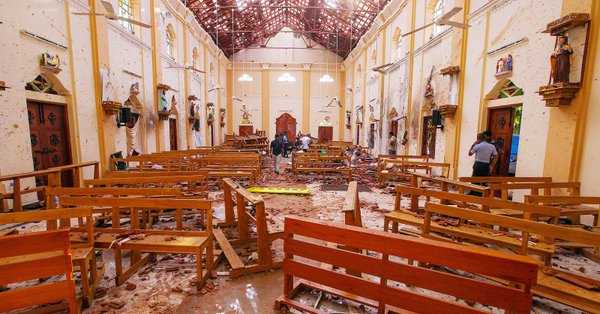Image: A church after the Easter Sunday attack (AP)
No group has claimed responsibility for the explosions, many of them suicide bombings, which killed 290 people and wounded 500 others – the deadliest attack in the island nation since the end of a civil war in 2009.
Experts said the targeting of churches and hotels where foreign tourists stay in Sri Lanka, which endured several suicide bombings targeting government officials and installations during the civil war, was a “new and worrying development” in the predominantly Buddhist country.
“These synchronised attacks are out of the ordinary for Sri Lanka. Compared with similar attacks in the Middle East and Southeast Asia, it has the DNA of attacks carried out by Islamic State and al Qaeda,” said Alto Labetubun, an anti-terrorism expert who has researched the two groups for a decade.
A senior Asian counter-terrorism official who declined to be identified said the attack was likely carried out by a group with “significant operational capability and skilled commanders”.
Sri Lankan President Maithripala Sirisena’s office said intelligence reports indicated foreign terrorist organisations were behind Sri Lankan militants and asked for help from foreign nations.
Rohan Gunaratna, a Singapore-based security expert, said the Sri Lankan group was the Islamic State branch in Sri Lanka and perpetrators were known to have links to Sri Lankans who travelled to the Middle East to join the hardline group in Syria and Iraq.
‘FOREIGN ACTORS’
Four of the bombs went off at roughly the same time on Sunday, at 8.45 a.m., with two others coming within 20 minutes.
Two other explosions rocked the city in the afternoon. Authorities later found unexploded devices and a van full of explosives in various locations.
The U.S. State Department issued a travel warning that said there was a threat of more attacks.
Last year, there were suicide attacks on churches in the Indonesian city of Surabaya and in the town of Jolo in the Philippines this year. Islamic State claimed responsibility for both those attacks.
Sri Lanka saw frequent suicide bombings before 2009 but ethnic minority Tamil separatist insurgents mostly went for government targets.
Sunday’s attacks marked a shift to churches and places associated with Western interests, experts said.
A history of conflict also means it was possible the perpetrators of Sunday’s attacks had access to weapons and explosives but it was also likely that foreign actors were involved, they said.
“With this scale of attacks, I don’t think this was only carried out by locals. There is most likely involvement of foreign groups or people, including people moving in and out of India or Pakistan,” said terrorism expert Labetubun.
Pratyush Rao, south Asia analyst at the Control Risks consultancy, said explosives were widely available in Sri Lanka.
“While the scale and sophistication of the attacks suggest an overseas link, there does not appear to be any evidence so far to link it directly to IS,” Rao said.
“It is plausible though that the attacks may have been inspired by IS tactics and ideology.”
Reporting by Kanupriya Kapoor in Jakarta and Joe Brock in Singapore, Additional reporting by Tom Allard in Bangkok; Editing by Raju Gopalakrishnan, Robert Birsel
